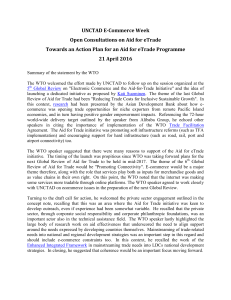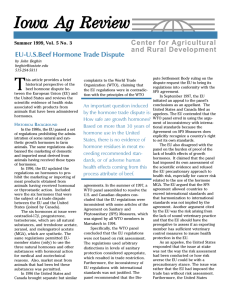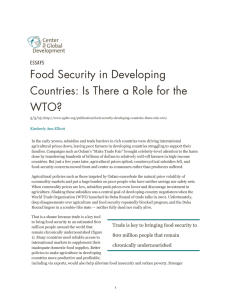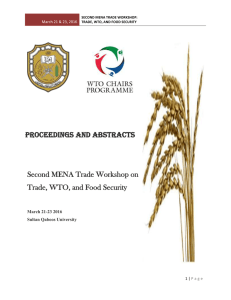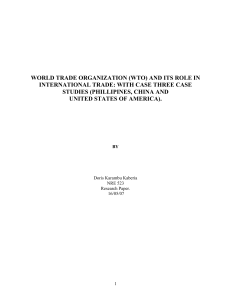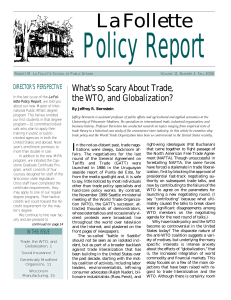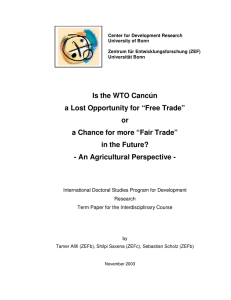U.S. praises WTO ruling Waterloo Cedar Falls Courier, IA
advertisement
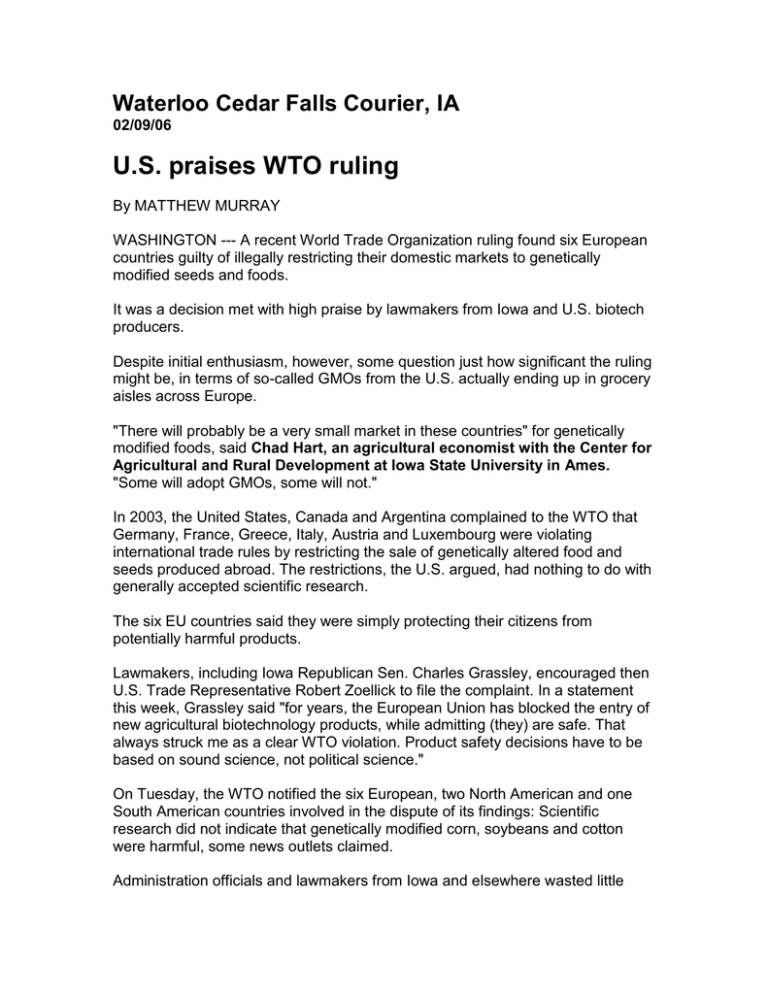
Waterloo Cedar Falls Courier, IA 02/09/06 U.S. praises WTO ruling By MATTHEW MURRAY WASHINGTON --- A recent World Trade Organization ruling found six European countries guilty of illegally restricting their domestic markets to genetically modified seeds and foods. It was a decision met with high praise by lawmakers from Iowa and U.S. biotech producers. Despite initial enthusiasm, however, some question just how significant the ruling might be, in terms of so-called GMOs from the U.S. actually ending up in grocery aisles across Europe. "There will probably be a very small market in these countries" for genetically modified foods, said Chad Hart, an agricultural economist with the Center for Agricultural and Rural Development at Iowa State University in Ames. "Some will adopt GMOs, some will not." In 2003, the United States, Canada and Argentina complained to the WTO that Germany, France, Greece, Italy, Austria and Luxembourg were violating international trade rules by restricting the sale of genetically altered food and seeds produced abroad. The restrictions, the U.S. argued, had nothing to do with generally accepted scientific research. The six EU countries said they were simply protecting their citizens from potentially harmful products. Lawmakers, including Iowa Republican Sen. Charles Grassley, encouraged then U.S. Trade Representative Robert Zoellick to file the complaint. In a statement this week, Grassley said "for years, the European Union has blocked the entry of new agricultural biotechnology products, while admitting (they) are safe. That always struck me as a clear WTO violation. Product safety decisions have to be based on sound science, not political science." On Tuesday, the WTO notified the six European, two North American and one South American countries involved in the dispute of its findings: Scientific research did not indicate that genetically modified corn, soybeans and cotton were harmful, some news outlets claimed. Administration officials and lawmakers from Iowa and elsewhere wasted little time responding to the WTO's preliminary decision. "The facts on agricultural biotechnology are clear and compelling," said Rob Portman, the current U.S. trade representative. "We believe agricultural biotechnology products should be provided a timely, transparent and scientific review by the European Union, and that is why Canada, Argentina and the United States brought the case in the first place." Sen. Tom Harkin, an Iowa Democrat, praised the group's decision, calling it "good news for U.S. agriculture" and indicated, like Portman, that the real winner in the GMO row may be poor countries. "The EU's moratorium against biotech crops violates a fundamental principle that trade rules of this kind must be based on good science and implemented without unreasonable delays," said Harkin in a statement. Some also claim that stoking the fears of developing countries could also be a result of Tuesday's interim report by the WTO. "The significance of this (preliminary) decision is sending a strong message to all countries, about the importance in basing your decisions on science," said Michelle Gorman, director of regulatory affairs at the American Farm Bureau Federation. Some environmental groups doubt whether a consumer market even exists in these six countries, citing Switzerland as a prime example. The landlocked country put the issue to public vote. It lost. "U.S agro-chemical giants will not sell a bushel more of their [genetically modified] grain as a result of the WTO ruling, said Daniel Mittler in a statement. Mittler is a trade advisor for Greenpeace International. "European consumers, farmers and a growing number of governments remain opposed to GMOs, and this will not change --- in Europe or globally," Mittler said. Contact Matthew Murray at m-murray4@northwestern.edu.


